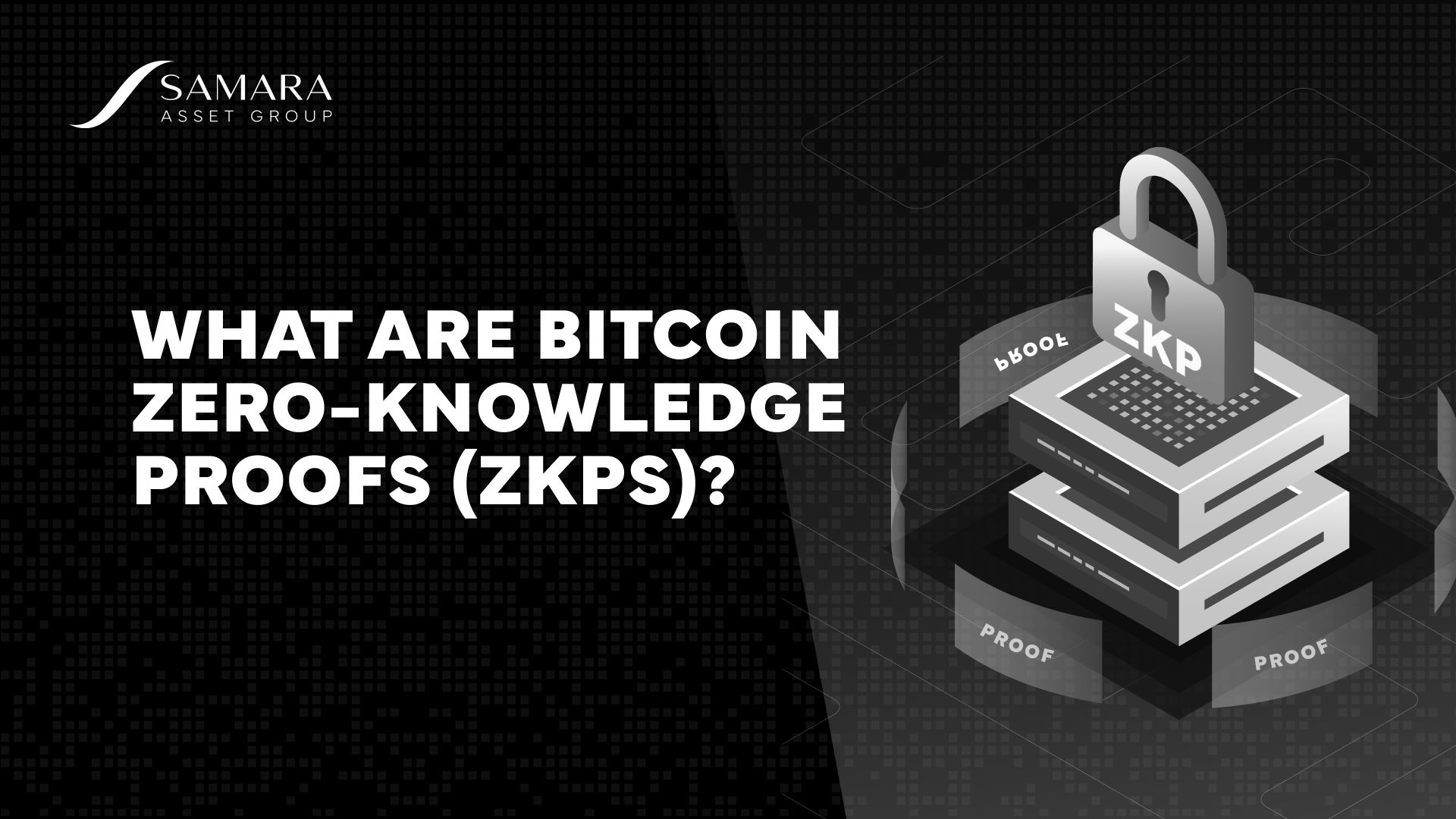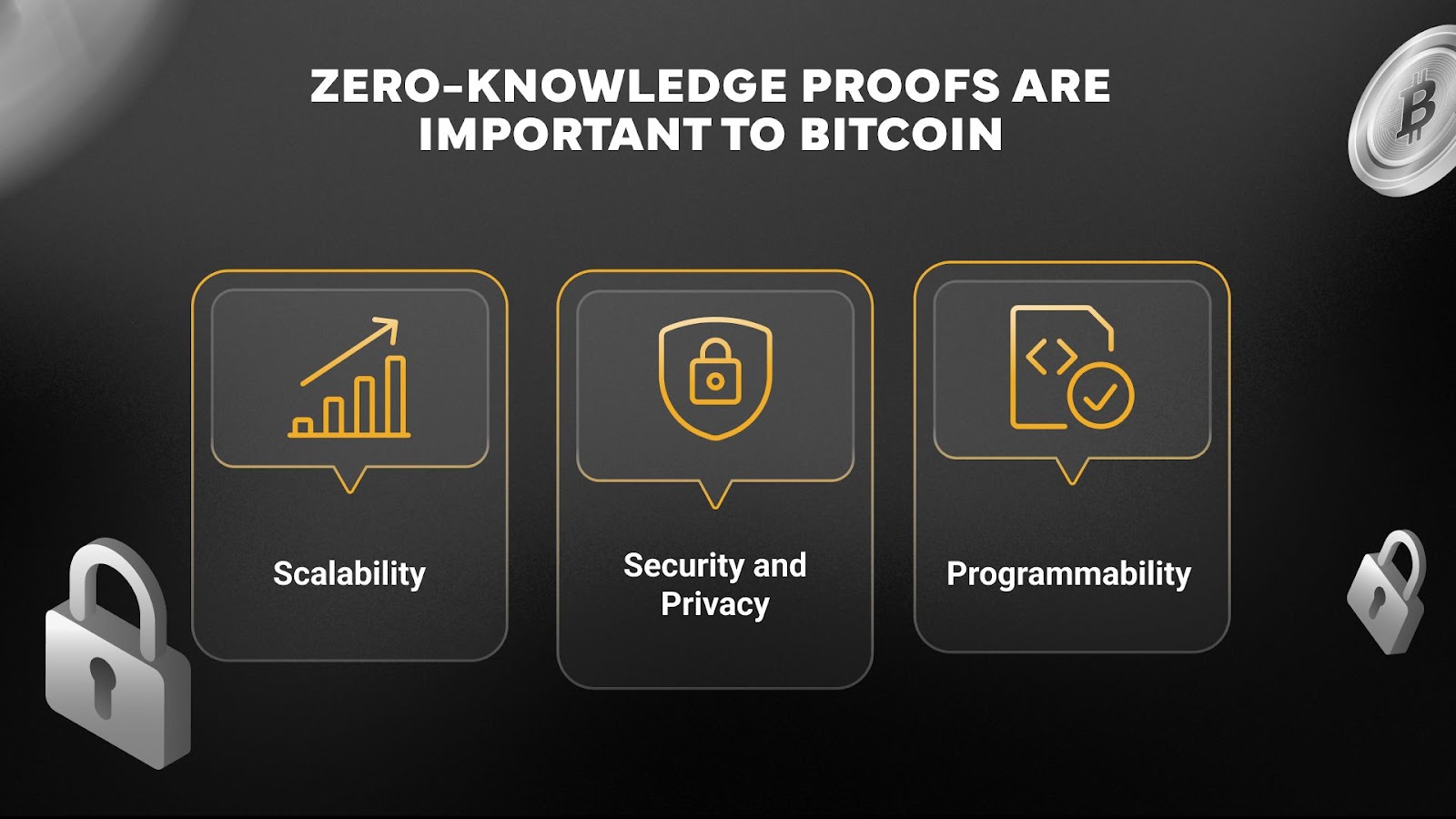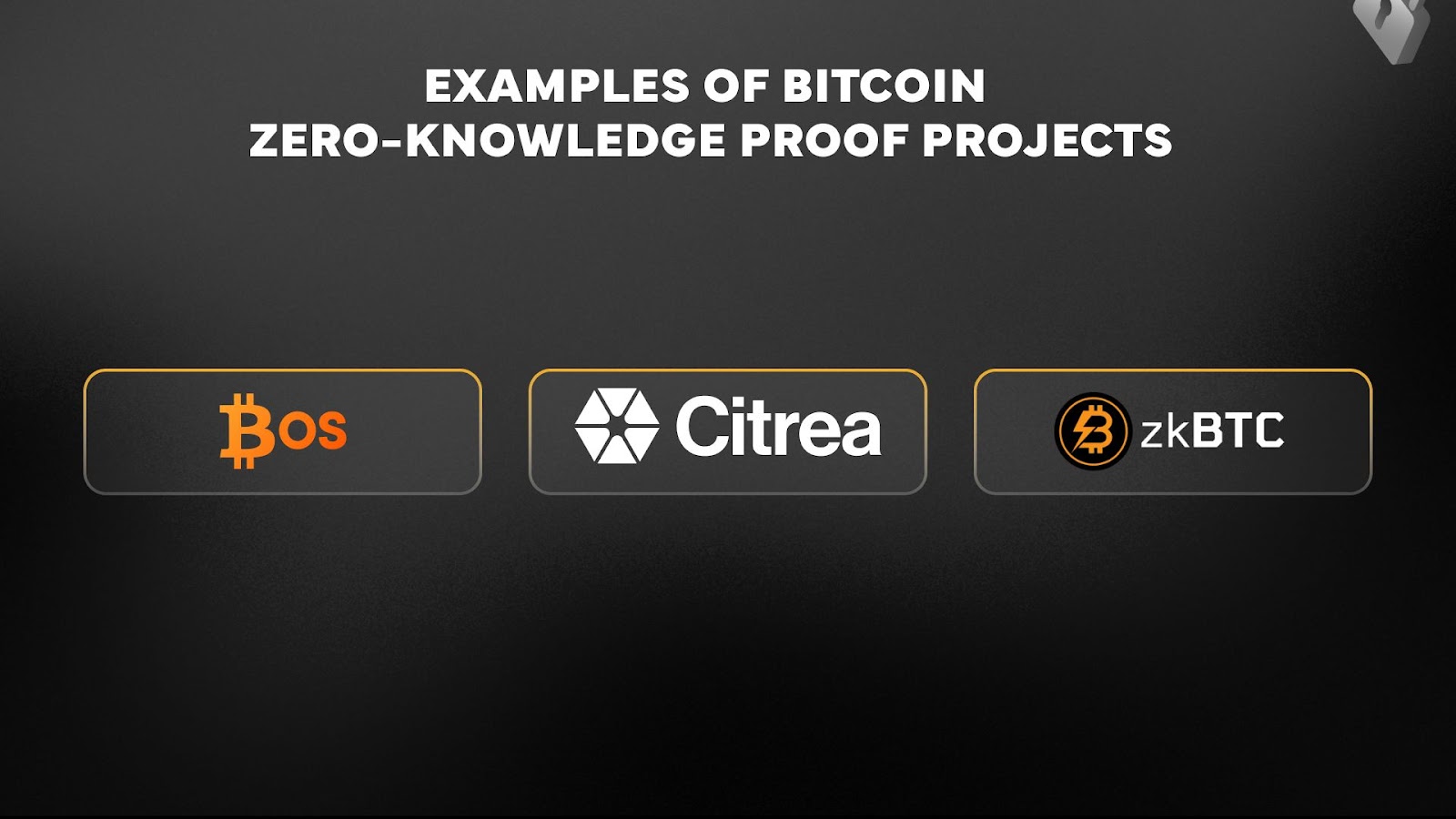Bitcoin
Bitcoin CPI
Venture Portfolio
Funds
Market Insights
Indicators
About
Contact

March 10, 2025





Bitcoin has been built by integrating the work of many researchers and developers from various fields, including cryptography. Now, one of the key concepts in cryptography, zero-knowledge proofs (ZKPs), is finding its way into Bitcoin, increasing its scalability and privacy, while also promising more Bitcoin use cases.
In this guide, you’ll learn about the concept of zero-knowledge proofs, how they work, why they’re important for Bitcoin, and what Bitcoin-related projects are already implementing ZKPs.
Zero-knowledge proofs (ZKPs) is a cryptographic method that enables a party to prove that something is true without revealing any unnecessary information.
Imagine if someone needs to prove their age but doesn’t want to reveal their personal data, such as their date of birth. The ZKPs method would allow exactly this - the age would have been proved and personal data protected.
How?
In simple terms, the prover would need to do something that only they can do if the underlying claim is true.
For example, if you would need to prove that you have a code to open a safe, you would need to open it without revealing the code itself.
In the blockchain world, this protocol is more complicated and involves complex processes. However, thanks to developers, you can already reap the benefits of ZKPs implementations, while even more zero-knowledge proofs-powered solutions should be available soon.
While the Bitcoin protocol itself doesn’t support this cryptographic method, zero-knowledge proofs on Bitcoin work indirectly via various implementations, including Layer 2 networks.
For example, so-called Bulletproofs are a type of ZKPs that help preserve confidentiality in Bitcoin-related systems without disclosing the value of the transaction. It's already being used on the Liquid Network, a Bitcoin sidechain.
Also, Bitcoin infrastructure company Blockstream is working on implementing ZKPs in their Bitcoin satellite solution–streaming blockchain data to/from their satellites by using ZKPs would make this process quicker.
Meanwhile, multiple teams are working on ZKPs-powered L2 solutions that would help Bitcoin scale and improve your privacy when using this network.
In either case, there are various possible ZKPs implementations in Bitcoin.
For example, STARKs, or Scalable Transparent Arguments of Knowledge, might help Bitcoin become more quantum-resistant. While SNARKs, or Succinct Non-Interactive Arguments of Knowledge, are better for quicker and cheaper transactions.

Various implementations of zero-knowledge proofs in the Bitcoin ecosystem should make it more secure, scalable, and private, while also increasing Bitcoin’s programmability, bringing more use cases along the way.
Zero-knowledge proofs are an important improvement to Bitcoin’s scalability as they help to process more transactions quicker and cheaper.
Developers have begun working on ZK-rollups that would help Bitcoin scale. Rollups are blockchains that execute all the necessary computations off-chain before settling them on the main blockchain, in this case, Bitcoin.
ZK-rollups combine both rollups and zero-knowledge proofs and make this computation process even more efficient, as ZKPs reduce the amount of data that needs to be sent to the base layer.
ZKPs also allow you to prove that your transaction is valid without the need to reveal unnecessary data, such as transaction history or BTC balance, that would compromise your privacy.
Moreover, ZKPs can increase the arsenal of measures for making Bitcoin more resistant to possible quantum computer attacks, further improving the security of your BTC portfolio.
Zero-knowledge proofs are being implemented in various solutions, such as Layer 2s, that would help increase Bitcoin’s programmability and, in turn, its use cases.
For example, they could help build more Bitcoin DeFi applications and increase Bitcoin’s interoperability with other blockchain ecosystems.
This would help strengthen Bitcoin’s position among other blockchains and allow you to enjoy a wider range of various applications, such as lending, borrowing, tokenizing real-world assets, and more.

There are multiple zero-knowledge proofs-powered projects in Bitcoin, and we’ve listed some of the most popular below:
Initiated by Sovryn, a Bitcoin DeFi platform, BitcoinOS is using ZKPs to develop a “superchain” of trustless and interoperable Bitcoin rollups.
BitcoinOS has already made its mark in the history of Bitcoin by verifying the first ZK-proof on Bitcoin. Moreover, it was accomplished without the need to fork Bitcoin's code.
This superchain, which is still in development, aims to enable Bitcoin rollups, programmable tokens, conditional payments, trustless bridging, and more efficient and private transactions.
The Citrea project is considered to be the first native ZK-rollup that enhances the capabilities of Bitcoin’s blockspace with zero-knowledge proof technology. This enables builders to create new applications on Bitcoin.
Moreover, Citrea uses Bitcoin both as a data availability and a settlement layer and is fully Ethereum Virtual Machine (EVM) compatible, helping EVM developers build on Bitcoin as well.
Multiple projects are being developed on Citrea, including lending, NFTs, bridging, and more.
zkBTC is targeting Ordinals, Runes, and BRC-20 tokens, promising more yield opportunities for the owners of these Bitcoin-powered assets. To do so, the team says they will use ZK-rollups to "trustlessly plug" zkBTC into Ethereum.
However, the project is still in development, and its testnet phase hasn't been reached yet. At the moment, zkBTC utilizes Polygon zkEVM for its base infrastructure.
Considering all the ongoing developments and existing use cases, zero-knowledge proofs are the next important step in improving Bitcoin’s scalability and technological capabilities.
ZKPs are a promising cryptographic method that can bring more use cases to Bitcoin and improve its scalability, privacy, and security.
If developers are successful, you’ll be able to enjoy faster, cheaper, and more private BTC transactions while also being able to find more ways to use your Bitcoin and access other blockchain ecosystems.
Therefore, ZKPs enable BTC to become more than a store of value or means of payment while also making it a more capable smart contract platform, helping it compete with other blockchains and attract more users, developers, and, subsequently, capital to Bitcoin.
While the Bitcoin protocol doesn’t natively support zero-knowledge proofs, they can be used indirectly via different implementations, such as Bulletproofs, while multiple Bitcoin Layer 2 projects are using this method to help Bitcoin scale, become more programmable, secure, and private.